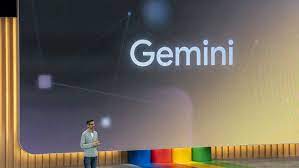On Thursday, Google unveiled a free artificial intelligence app that will embed the technology inside smartphones. This will allow users to instantly establish a connection with a virtual assistant that can assist with life management, write, read, and analyze what they see and read.
Google is planning to cast aside the Bard chatbot it introduced a year ago to catch up with ChatGPT, the chatbot released by Microsoft-backed startup OpenAI in late 2022. The Gemini app is named after an AI project that was unveiled late last year. Google is launching the standalone Gemini app for Android-powered smartphones right now.
While Apple would prefer that users rely on its Siri voice assistant for various tasks, Google will integrate Gemini’s functions into its current iPhone search app in a few weeks.
While the long-standing Google voice assistant will remain available, business executives anticipate that Gemini will take center stage as the primary means by which consumers utilize technology to assist with planning, creation, and thought processes. It is Google’s next step towards its original mission of “organizing the world’s information and making it universally accessible and useful,” while also taking the company down a novel and possibly dangerous path.
Before Thursday’s presentation, Sissie Hsiao, a Google general manager in charge of Gemini, told reporters, “We think this is one of the most profound ways we are going to advance our mission.”
The Gemini app will be available in English first in the United States and will be available in Japanese and Korean starting next week when it expands to the Asia-Pacific area.
In addition to Gemini’s free edition, Google will charge $20 per month for a sophisticated service that can be accessed via the new app. According to the Mountain View-based Corporation, this advanced form of artificial intelligence (AI) enables it to instruct students, give engineers advice on computer programming, generate project ideas, and then produce content for the recommendations that users find most interesting.
The Gemini Advanced option aims to expand on the nearly 100 million global subscribers that Google claims it has already drawn. The majority of these users pay $2 to $10 per month for additional storage to back up photos, documents, and other digital content. The Gemini Advanced option will be powered by an AI technology called “Ultra 1.0.” Google now charges $10 per month for 2 terabytes of storage; therefore, the company feels the AI technology is worth an extra $10 per month for the Gemini Advanced membership.
To entice users to try Gemini Advanced, Google is providing a free two-month trial.
As part of a trend started by Google with the introduction of its most recent Pixel smartphones last autumn and adopted by Samsung with the release of its most recent Galaxy smartphones last month, the launch of the Gemini applications highlights the building moment to bring more AI to smartphones — gadgets that accompany people everywhere.
Additionally, it is probably going to intensify the high-stakes AI competition between Google and Microsoft, two of the biggest corporations in the world, vying for control over a technology that has the potential to completely transform entertainment, the workplace, and maybe even humankind itself. Since the end of 2022, the conflict has already helped to boost the combined market values of Microsoft and Alphabet Inc., the parent company of Google, by $2 trillion.
Google CEO Sundar Pichai stated in a blog post that Gemini Advanced Technology will be able to tackle many complex problems and outsmart even the most intelligent humans.
Laptops 1000Pichai stated, “Ultra 1.0 is the first to outperform human experts on (massive multitask language understanding), which tests knowledge and problem-solving skills across 57 subjects including math, physics, history, law, medicine, and ethics.”
However, on Wednesday, Microsoft CEO Satya Nadella made a point of highlighting the capabilities of the ChatGPT-4 chatbot, which was introduced about a year ago and was trained on large-language models, or LLMs, by OpenAI.
At a Mumbai, India, event, Nadella declared, “We have the best model, even today.” He said, “We’re waiting for the competition to arrive,” as if he was looking forward to Gemini’s next-generation release. I’m confident it will arrive. However, the truth is that we have the best LLM available.
Fears that artificial intelligence (AI) would malfunction and behave badly on its own or be exploited by humans for evil intent, including distributing false information in politics or tormenting its adversaries, are growing stronger as AI becomes more complex. Because of this potential, regulations governing the use of AI have already been passed in Europe, and the United States and other nations have followed suit.
The upcoming Gemini products, according to Google, have undergone rigorous testing to guarantee their safety and were designed with its AI principles—being socially useful, avoiding unfair biases, and being accountable to people—in mind.

















